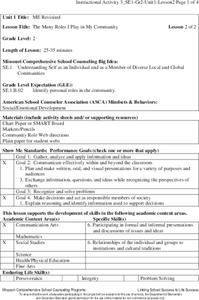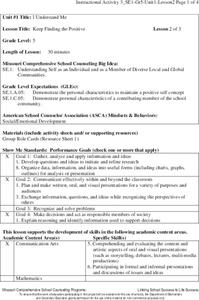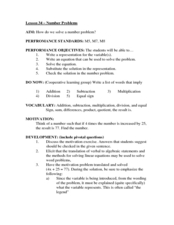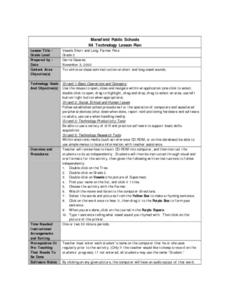Missouri Department of Elementary
The Many Roles I Play in My Community
Small groups brainstorm their roles in the community. Then, individually, complete a community roles web worksheet. Peers share their completed product and extend the conversation to include the feelings and character traits that go...
Missouri Department of Elementary
Goldilocks Revisited
After a read-aloud of the story Goldielocks and the Three Bears, scholars gather into small groups to answer a series of questions. Peers examine the idea of smart decisions and identify three feelings of characters alongside three...
Missouri Department of Elementary
I’m Thumbody!
Positive and negative thinking is the focus of a lesson that boost self-awareness. Beginning with a whole-class discussion, scholars brainstorm what positive thinking looks and sounds like then compares and contrast the two types of...
Missouri Department of Elementary
Keep Finding the Positive
Group members take on roles to create a positive classroom community. Learners perform their role—leader, recorder, presenter, timekeeper, encourager, and collector—in preparation for a formal presentation of their positive thinking...
Missouri Department of Elementary
My Problem…Your Problem…Our Problem
Encourage sixth graders to take responsibility for their actions and become a problem solver. Pupils discuss new problems faced in sixth grade then identify ones that involve other people. A worksheet guides their practice in conflict...
Missouri Department of Elementary
Acting Out Respect
Bert and Ernie, Lucy and Ethel ... what makes a great friend? Pupils first learn about the STAR method of problem solving: Stop, Think, Act, Review. Small groups then role play various scenarios to demonstrate respect and compromise in...
Missouri Department of Elementary
The Problem Solving Game
Creativity, communication, cooperation. Pupils assume the role of employees at a game factory working together to develop a new game. Using the principles of the STAR method (Stop, Think, Act, Review), they work in teams to create game...
Missouri Department of Elementary
How Does a Friend Act?
Two puppets showcase social skills while scholars decide whether their actions are positive or negative. Learners take turns with the puppets, acting out scenarios with a peer while the rest of the class decide if they're being a good...
Missouri Department of Elementary
How Do I Act Like a Friend?
Familiar puppets set the stage for a thoughtful discussion about friendship. To show what they know, scholars role-play scenarios. Peers offer a thumbs up when they view positive character traits exhibit good friend behavior.
Missouri Department of Elementary
How We Are Alike And Different
Scholars develop social awareness by exploring the concept of similarities and differences. Learners examine two beverages and use a Venn diagram to identify similarities and differences. They tally each item to identify if they are more...
Missouri Department of Elementary
Communicating with I-Messages (1/2)
Scholars watch two puppet dialogues illustrating negative and positive communication between friends. Then, they discuss how the puppets' communication skills influenced the outcome of each interaction.
Missouri Department of Elementary
Celebrate Your Culture
After a class discussion about celebrations and customs, class members draw pictures depicting special events from their family cultures. Next, they draw pictures of an event from a different culture and share their work with classmates.
Missouri Department of Elementary
Communicating with I-Messages (2/2)
Class members read a handout to learn about using I-Messages—honest statements that begin with I to get their points of view across. Next, learners practice using I-Messages with partners to better communicate without hurting others'...
Missouri Department of Elementary
Conflict Mediation – Part 2: Practice
A lesson challenges scholars to prove their understanding of conflict mediation. Small groups role-play scenarios using two mediators and two disputants. Peers observe then discuss their findings. A worksheet outlines groups'...
Missouri Department of Elementary
Conflict Mediation – Part 1: Getting Ready
Two scholars walk into a room arguing, what is happening? Peers observe the two actors in preparation for a whole-class discussion about conflict. Learners establish a conflict, name the three approaches—passive, aggressive, and...
Curated OER
Number Problems
Students write equations for problems. In this number lesson, students add, subtract, multiply and divide numbers to solve for a variable. They rewrite word problems using algebraic symbols.
Missouri Department of Elementary
The Successful Student: Just Checking
The final lesson in a skill-based series focuses on setting goals and making checklists. Class members discuss what it means to set realistic goals and practice making lists to manage their time effectively.
Missouri Department of Elementary
Dealing with Peer Influence: What Are Bullying and Harassment?
Scholars examine examples of peer pressure and discuss how specific actions negatively affect one's well-being. Learners gather in small groups to write two scenarios in which peer pressure is used. They reference the STAR method in how...
Nazareth College
Create Your Own Tornado
Third graders identify key concepts and definitions about tornados. They work in small groups of three to four to create mini-tornados. After reading Tornado Alert as a class, 3rd graders discuss tornados and fill out a KWL chart.
Curated OER
The Power of Mental Images: Visualizing Literature
With a chapter book in hand, readers practice visualizing the events and characters of the story. The lesson gives suggestions of novels that are rich in detail to help facilitate the process. Drawings from what they read act as the...
Missouri Department of Elementary
Relationships…Quality Control
Quality relationships don't just happen. They require nurturing, patience, thoughtful communication, and honesty. Help tweens develop these relationship skills with an activity that asks them to themselves and then outline a...
Curated OER
Joyful Noise: Poems for Two Voices by Paul Fleischman
Do your young readers know that poems can be performed as a team? They listen to a few examples from Paul Fleischman's book Joyful Noise: Poems for Two Voices, paying attention to how the how readers work together. They examine the...
Curated OER
Playing with Language
Try these parts of speech games and activities that will help your learners tackle using correct grammar.
Curated OER
Vowels Short And Long: Farmer Pete
Second graders study short and long vowel sounds. They hear each word or picture by clicking on it to hear each rhyme. There is also the option of letting some students type their own rhyming sentence in this program. They complete a...

























